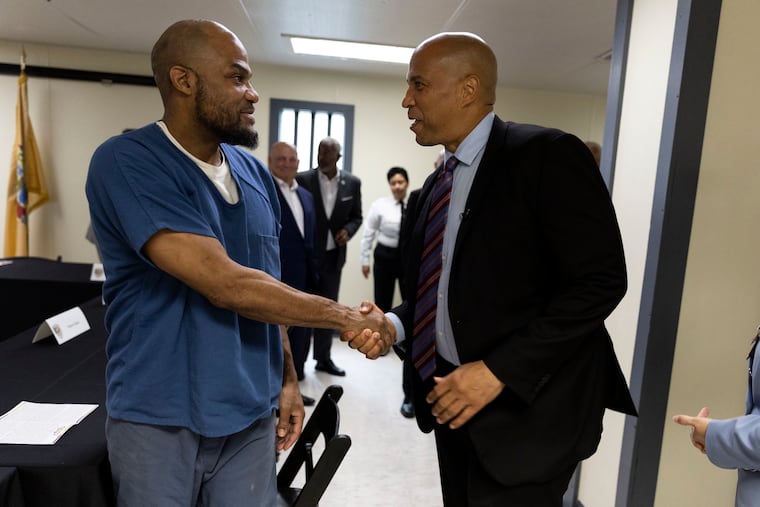Fetterman, Booker: The war on drugs didn’t work. We need a fresh approach to address the fentanyl crisis.
As former city mayors, we know firsthand how drugs can devastate neighborhoods and cause ripple effects that can cripple entire communities. People deserve evidenced-based solutions that work.

More than 50 years ago, our country declared a war on drugs. Today, it’s clear as ever that this war has failed.
In 2022, more people in our country died of drug overdoses than in any year before. Here in New Jersey and Pennsylvania, the spread of fentanyl has led to record-high fatalities, leaving too many families to cope with the irreparable loss of loved ones.
In July, the White House released a national response plan to combat the emergent threat of xylazine, an animal tranquilizer often mixed with fentanyl, which can cause devastating effects. Commonly known as tranq, it depresses breathing, heart rate, and blood pressure. It also causes chemical burn-like flesh wounds that can mangle the limbs so badly that some doctors resort to amputations to prevent infections.
Xylazine is also now inescapable in our region: In Philadelphia alone, xylazine was found in over 90% of drug samples tested.
Yet, in response to these new and evolving threats, too many policymakers are proposing the same failed policies of the past and somehow expecting different results. In Congress, some want our response to the opioid crisis to go no further than ratcheting up criminal penalties for fentanyl-related substances or xylazine.
Too many policymakers are proposing the same failed policies of the past.
In other words, our colleagues want to fight the opioid crisis by continuing the same war on drugs — a war that for decades has destroyed the very communities it intended to help
This is a fool’s errand. Research shows that simply locking up more people doesn’t deter drug use or curb overdose deaths. In reality, the practice has led to jailing mainly low-level drug users. Meanwhile, drug kingpins — who should be held accountable for profiting off of others’ pain — largely go unpunished. In other words, they’ve got it all backward.
Rather than persisting in an endless game of whack-a-mole, chasing new drugs only after they’ve invaded our communities, we need to get ahead of this fight by tackling the root causes of this crisis head-on.
Here’s how we should start.
First, we must expand access to care and harm-reduction tools. A recent study found that 87% of people with an opioid use disorder don’t receive treatments that have been proven to work. Congress took an important step last year by allowing more health-care professionals to prescribe buprenorphine — one of the most effective medications for treating opioid addiction and reducing overdose deaths — but this change has not led to greater prescribing of the medication. We need to go further.
» READ MORE: Germany’s open-air drug market remains a vibrant community space. What can Philly learn from it? | Opinion
Pharmacies are a viable pathway. Nearly 90% of Americans live within five miles of a pharmacy, and patients visit them more often than they do their doctors. A preliminary study found that pharmacists can safely start patients on buprenorphine, and those followed by a pharmacist were more likely to keep taking it than those who were referred to their doctors for continuing treatment. To expand access, Congress should incentivize more states to permit pharmacists to prescribe this treatment medication.
Test strips are also important. These strips allow people to check if a drug or pill contains xylazine or another substance that could kill them. Despite clear evidence that test strips can be lifesaving, some states still criminalize certain test strips as drug paraphernalia. Pennsylvania has legalized fentanyl test strips, but some counties have reported struggling to meet the growing demand due to limited supply. Congress should invest in test strip distribution and encourage states to decriminalize their use, to ensure every American has access to these lifesaving devices.
The federal government must invest more in testing and recovery support. State, federal, and local agencies that do forensic testing often work in silos, making it difficult to fully study existing street drugs and detect new ones before they spread. Once substances are tested, we must also undertake a comprehensive cross-government research initiative on their health effects and on the best tools to effectively treat patients.
We must also prioritize providing clear recovery pathways for people struggling now. As a start, Congress should end policies restricting people with drug felonies from accessing food stamps and offer more housing assistance. Important, too, is eliminating unnecessary federal barriers to medical and substance abuse care for incarcerated people, who are substantially more likely to die from a drug overdose after their release. The treatment programs in the Philadelphia and Camden jails have become national models and should expand to other cities.
Finally, we must step up enforcement by intercepting the supply of fentanyl, xylazine, and other deadly drugs before they reach our communities. Last month, the two of us proudly cosponsored and passed legislation in the Senate that cracks down on drug traffickers and sanctions criminal drug organizations, from suppliers in China to cartels in Mexico, who are manufacturing these lethal drugs.
As former city mayors, we know firsthand how drugs can devastate neighborhoods and cause ripple effects that can cripple entire communities. But we also know that punitive policies of the war on drugs have failed us before and will do so again.
People deserve evidenced-based solutions that work. They deserve access to care and federal resources. They deserve a public health response to a public health crisis, one that invests in treatment and recovery and disrupts the supply chain of these lethal drugs. These solutions — not mass criminalization — will make our neighborhoods safer and save lives.
Cory Booker is a U.S. senator for New Jersey. John Fetterman is a U.S. senator for Pennsylvania.